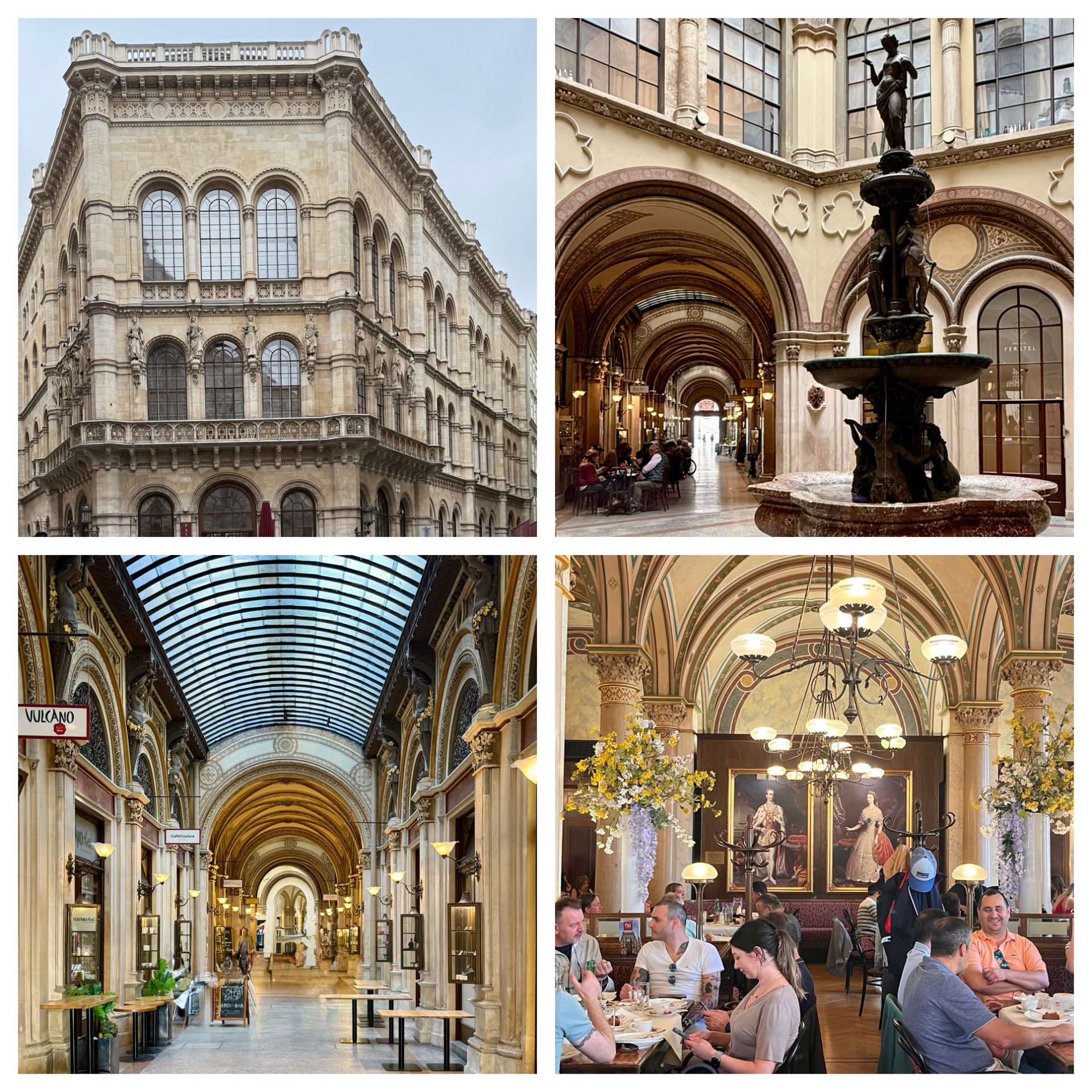Experience Travel Insights
Cafe Central: More Than a Coffeehouse, It’s the Soul of Vienna.
by Long Lin-Maurer • September 23, 2025

To step into Café Central Vienna is to cross a threshold not just into a building, but into an era. The air, thick with the scent of roasted coffee and warm pastries like Apfelstrudel, seems to hold the echoes of whispered arguments, revolutionary ideas, and the rustle of newspapers. Located within the palatial confines of the former Bank and Stockmarket Building, now known as Palais Ferstel, this is more than just one of Vienna’s most famous coffeehouses. It is a living archive and a cornerstone of Viennese coffee house culture, a crucible of intellectual history where the fate of 20th-century thought was debated over melanges and slices of Sacher-Torte. To understand Cafe Central is to understand the soul of Vienna at its most brilliant and complex apex.
A Palace for Coffee: The Architecture of Kaffeehaus Central
The very architecture of Kaffeehaus Central announces its ambition. Designed by the celebrated architect Heinrich von Ferstel in a grand Neo-Renaissance style, the space was never intended to be merely functional. Opened in 1876, its soaring, vaulted ceilings and elegant marble columns create a cathedral-like atmosphere. The grand arches and polished wood panelling do not just enclose a room; they frame a stage. This was a purpose-built environment designed to elevate coffee drinking into a ritual of intellectual engagement. The soft clinking of porcelain, the low murmur of conversation, and the gentle strains of live piano music all contribute to an ambiance that encourages one to linger, to think, and to converse.
The “Centralists”: A Legendary Intellectual Hub
A café is defined by its clientele, and for decades, the regulars of Cafe Central—known as the “Centralisten”—comprised a staggering cross-section of the Austro-Hungarian Empire’s intelligentsia. This was the unofficial headquarters of Viennese modernism, a place where art, science, politics, and philosophy collided daily.
Come and experience travel!
Personally designed, seamlessly delivered – your journey, our expertise!
We are a boutique travel agency and consultancy specializing in Hub & Spoke Tours across Central Europe, the Benelux and the Dolomites.
At the heart of this world was a vibrant circle of Jewish writers and thinkers. Peter Altenberg, the bohemian poet, was perhaps the café’s most famous resident. He used it as his office and mailing address, famously giving its location, “Wien 1, Herrengasse 14,” as his own. A life-sized statue of him still greets visitors, a permanent tribute to the café’s patron saint.
He was joined by luminaries like Alfred Polgar, who saw the coffeehouse as a place for those who “want to be alone, but need company for it.” Arthur Schnitzler, the physician and playwright, was a frequent visitor, as was the author Stefan Zweig. These figures, along with Karl Kraus and Felix Salten, formed a literary powerhouse, their work born from endless hours of debate within these walls. But the intellectual ferment extended far beyond literature. Psychoanalysis was a constant topic of discussion. While Sigmund Freud preferred the nearby Café Landtmann, his rival, Alfred Adler, was a fixture at Central. Even political revolution was felt here. Before the First World War, a Russian exile could be found hunched over a chessboard; the world would later know him as Leon Trotsky.
The Central Café: An Extension of Viennese Life
This historic Viennese coffee house, and The Central Café in particular, fulfilled a unique social function. It was not merely a place for refreshment but an indispensable extension of home—an office, a library, and a social club rolled into one. An entry fee of a single cup of coffee bought a patron the right to sit for hours, warmed by the stove and intellectually nourished by a vast selection of international newspapers.
This created a uniquely democratic space. In the coffeehouse, a penniless poet could sit adjacent to a wealthy industrialist. What mattered was not station, but the quality of one’s conversation. It was a haven for intellectual exchange, a neutral ground where radical new ideas could find an audience. This dynamic made it the engine of the city’s cultural and intellectual life.
Come and experience travel!
We design bespoke travel experiences with a perfect balance of cultural depth, efficiency and comfort.
Specializing in seamless hub-and-spoke journeys, we create well-paced, immersive itineraries tailored to your interests.
The End of an Era and the Resilience of a Famous Vienna Cafe
The vibrant, diverse intellectual culture that flourished at Cafe Central came to a brutal end with the *Anschluss* of 1938. The “Centralists” were scattered; many fled into exile, while others fell victim to the Holocaust. The closing of this famous Vienna cafe at the end of the Second World War seemed to be the final, somber postscript to a golden age.
For decades, the magnificent hall lay dormant. But Vienna’s memory is long. In 1986, after a meticulous restoration, Cafe Central reopened, its physical grandeur restored. It was a conscious act of cultural reclamation, a refusal to let the spirit of this legendary institution be forgotten.
Today, sitting beneath the same arches where Trotsky played chess and Altenberg held court, one feels an undeniable connection to that history. It is a testament to resilience, a space that carries the weight of its past with grace. It invites visitors not just to enjoy a coffee, but to partake in a living tradition—a reminder that the power of ideas, conversation, and a shared space for contemplation can, and must, endure. A visit is a journey into the heart of Vienna’s complex identity: its brilliant heritage, its profound losses, and its enduring capacity for renewal.
Cultural and Historical Insights into Cafe Central, Vienna
- General History and Cultural Significance: A comprehensive overview of Cafe Central’s historical trajectory and its profound impact on Viennese culture and intellectual life.
- Wien Geschichte Wiki – Cafe Central: An in-depth historical article provided by the City of Vienna’s official history wiki, offering detailed insights into the establishment.
- Historic Photograph from Wien Museum Collection: View a digitized historic photograph of the old Cafe Central building from the Wien Museum’s extensive online collection, showcasing its architectural heritage.
- Historical Press Mentions (Austrian National Library): Explore digitized historical newspaper articles and press mentions of Cafe Central through the decades via the Austrian National Library’s ANNO project.
- UNESCO Recognition of Viennese Coffeehouse Culture: Understand the broader cultural context of Cafe Central within the UNESCO-recognized Intangible Cultural Heritage of Viennese coffeehouse culture.
- Vienna’s Coffeehouse Culture Overview: An overview of Vienna’s celebrated coffeehouse culture by the official Vienna Tourist Board, highlighting Cafe Central’s iconic status and historical significance.
- Works of Peter Altenberg at Project Gutenberg: Access the literary works of Peter Altenberg, the renowned “coffeehouse poet” who famously made Cafe Central his second home and embodied its intellectual spirit.
- Europeana Digital Cultural Heritage Collection: Discover a collection of digitized cultural heritage objects, images, and texts related to Cafe Central and the era it flourished, from Europe’s digital library.
- Vienna 1900: A Cultural and Intellectual Maelstrom: An article from the Austrian Cultural Forum New York discussing Vienna around 1900, the intellectual and cultural vibrancy where Cafe Central played a pivotal role as a gathering place for minds.
- A Coffeehouse in Vienna Where the Best Minds Met: An article from Austrian Information exploring the intellectual legacy of Cafe Central as a meeting point for prominent thinkers, artists, and writers during its heyday.
